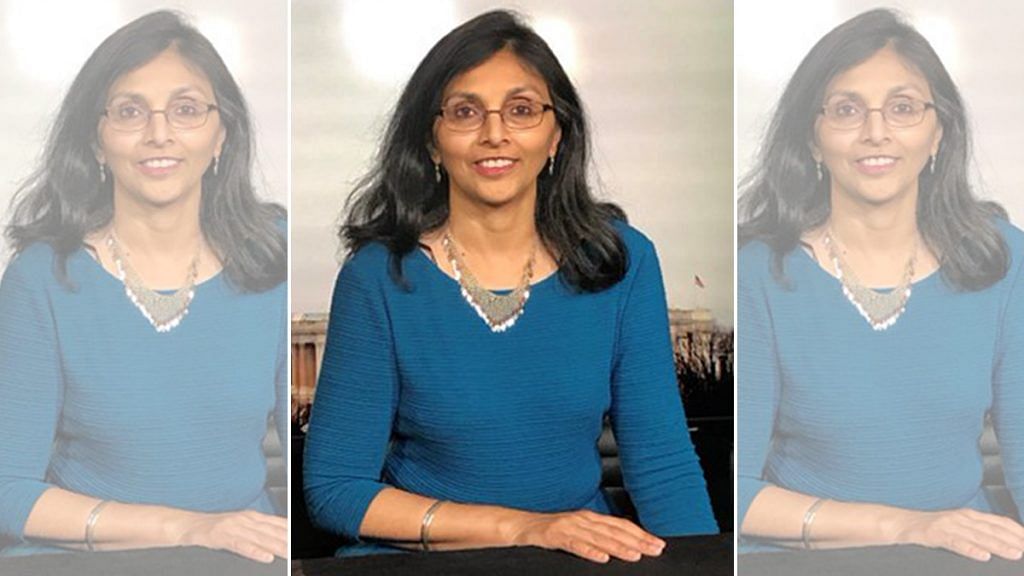New Delhi: With India undertaking a slew of economic reforms and looking at boosting growth, it is imperative for the nation to become an “industrial power” in order to be a “global power”, said Nisha Biswal, president of the US-India Business Council (USIBC) at the US Chamber of Commerce.
In a Skype interview to ThePrint, Biswal said it is important for both sides “to focus on deepening of economic partnership” as well as strengthening the bilateral strategic gains made under the outgoing Donald Trump administration.
“India’s geopolitical importance to the US will remain and I expect that to continue but I also do think that there is a real need to deepening the economic partnership between our two countries. That is going to require both countries to think about the geopolitical implications of an economic partnership,” said Biswal, who was assistant secretary of state for south and central Asian affairs under President Barack Obama.
According to Biswal, India and the US should now aim at taking bilateral ties to its “full potential” where both countries will need to manage their political imperatives to “unleash greater trade and investment”.
“The trade wars and tariff wars are likely to be a thing of the past as a new administration comes in with a new approach. That doesn’t mean there won’t be a focus on trade … In the strategic circles, it is well understood that to be a global power you need to be an industrial power and India is well poised where it can indeed rise not only on the geopolitical influence but increasingly also in economic importance and influence,” she added.
Under the Trump era, India and the US stated for the first time officially their intent to have a far-reaching free trade agreement (FTA) that will be preceded by a mini-trade deal to address the immediate trade concerns in terms of greater market access and lowering barriers to trade.
But it was under the Obama administration that both sides had set a target of $500 billion worth of two-way trade in goods and services.
Also read: Foreign Secretary Shringla in Nepal to ‘take ties forward’ after low point of Kalapani row
‘Too early to discuss FTA’
Biswal said while both sides will work towards strengthening the trading and investment ties between the countries, it is too early to predict if talks on having the FTA will be on priority.
“We do not know who the trade negotiator will be. We have not yet seen what the economic team in the (Joe) Biden and (Kamala) Harris administration is going to be. I am excited by the announcement of Janet Yellen to be the treasury secretary. I think there is a lot of confidence in the private sector about her being a good manager of the US economy,” she said.
The shape of future trade direction will also depend on how the US Congress shapes up, the USIBC chief said. “There is a lot we need to see how it unfolds … There is huge potential of trade in the US-India corridor.”
Bilateral trade ties under Trump worsened when the US removed India from the trade benefit programme under the Generalised System of Preferences (GSP) scheme in June last year.
India has since been pushing the US to restore the GSP trade benefits, through which the country used to get benefits worth around $6 billion — out of the $46 billion worth of goods it exports to the US — by means of zero or reduced tariffs on 2,167 products.
India has been also pushing the US to remove tariffs on shipments of steel and aluminium that were imposed under the Trump government.
Also read: Mini trade deal ‘stuck’ as US now wants India to buy $6 billion of agriculture, dairy goods
‘India needs to do a lot more’
According to Biswal, New Delhi also has to focus a lot more on granting market access to American products and work towards lowering of tariffs on certain items.
“This is something India has been slowly but steadily trying to address, but I think it needs to accelerate. If you are going to be part of a trading bloc you’ve got to be willing to lower your own barriers to entry to be able to access the markets of other countries,” she said, adding India has been historically guarded of its own market.
“With market access comes enormous flow of investments into the Indian economy to build up the industry that can then create the more efficient economic engine that India is planning to put in place,” she averred.
USIBC chief also highlighted the issues on taxation and how large-scale investments get impacted by certain changes in the policy despite stable regulatory conditions.
She highlighted that for India to become a member of the mega trade pact, Trans-Pacific Partnership (TPP), in the event that US, under the Biden administration, decides to re-enter it, New Delhi will have to take certain firm decisions.
“It really depends on India. There is no trading bloc in the region or in the world that would not be enhanced or improved with an Indian inclusion if India is willing to come in and adhere to and match the policies that exist in that bloc,” she said.
“…I think India needs to become a global hub, and not just in terms of its own consequential domestic economy,” she added.
This reporter has previously worked with USIBC.
Also read: Jaishankar meets Abu Dhabi Crown Prince, discusses India-UAE cooperation in post-Covid era
